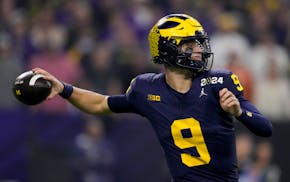It was the summer of 1998. The Star Tribune dispatched me to St. Louis to interview Mark McGwire, who was dueling with Sammy Sosa to break baseball's single-season home-run record.
McGwire and Sosa were widely said to be saving baseball, which had languished after a lockout canceled the 1994 World Series.
This kind of thinking can be overdone. If McGwire and Sosa hadn't "saved" baseball, then the Yankees' run of championships or the rise of the Red Sox or simply the pervasive grass-roots popularity of baseball would have kept the game alive. But as McGwire and Sosa launched home runs while trading banter and even hugs, they charmed the country, giving casual fans reason to watch.
For those not knowledgeable about the efficacy of performance-enhancing drugs, like most sportswriters of that time, McGwire and Sosa were godsends bordering on the godlike. Baseball always had been the most democratic of major sports when it came to body types. McGwire and Sosa looked like functional Schwarzeneggers compared with many who played the game in previous decades.
McGwire had grown weary of attention by the time I reached him. He eventually agreed to an interview, but asked to do it in the hallway outside the clubhouse. Even someone who had covered the NFL had to be awestruck by McGwire's sheer size.
We would learn later that McGwire and Sosa had cheated. The transgressions of those two players and those who emulated them would not destroy baseball. In fact, realists would arrive at the conclusion that baseball might have been better when the best players were cheating.
Saturday night in Anaheim, we saw the true cost of baseball's PED era. Albert Pujols became the ninth player in baseball history to reach 600 home runs, and his achievement was celebrated with an enthusiasm that would not match that of a quality NFL regular-season game.
Steroids ruined home runs even for those who did not take them.
Pujols reached his milestone with great drama. He became the first person to make his 600th home run a grand slam. His team won the game. He told USA Today that he would like to play long enough to challenge Barry Bonds' record of 762.
If he broke that record, would people care?
Perhaps Pujols' personality and situation dampened enthusiasm this season. He plays on the West Coast, meaning even many Twins fans might may not have stayed tuned for his blast late Saturday night. He is at best the second-best player on his own team, behind Mike Trout. He never has hit 50 home runs in one season, instead building his career total at a workmanlike pace à la Hank Aaron.
He is a technician more than a showman, and his personality is bland. He engenders neither love nor hate.
Despite all of those explanations, it remains a stunning new reality for a longtime baseball writer that baseball's home run records are no longer objects of romance and lore.
And that may not change in the foreseeable future. Miguel Cabrera is second among active players with 451 home runs. Adrian Beltre is third with 446. Pujols reaching 600 could have, should have, been one of the great baseball achievements of the decade, and yet the Angels did not come close to selling out the ballpark and the national media treated it as it would any other minor story of note.
Pujols needs 10 home runs to bump Sosa from eighth on the all-time list and become the most prolific foreign-born home run hitter in baseball history.
When Pujols passes Sosa, he might want to proffer a certain gesture, to thank Sosa for devaluing Pujols' greatest achievements.
Jim Souhan's podcast can be heard at MalePatternPodcasts.com. On Twitter: @SouhanStrib. • jsouhan@startribune.com

Souhan: Wolves fans made Game 1 special. Now bring on Game 2.

Souhan: Should Vikings even consider McCarthy in NFL draft?

Souhan: NAW erases Suns' lead, Game 1 advantage with big performance

Souhan: This is KAT's chance to prove Flip Saunders was right

